It sometimes feels like we are an endangered species. Computers just keep getting smarter; not only are they immeasurably better at doing maths and playing chess than us but now they even beat us at quiz shows! In the competition between silicon chips and grey matter is there really anything that we are best at?
We needn’t worry about the Rise of the Robots just yet, because that squidgy grey blob in your skull (your brain) is still the most powerful computer in the world: It was recently calculated that just one human brain has the same computing power of all the computers in the world - combined! So while microchips are great at crunching numbers and dealing with vast amounts of data, when it comes to recognising familiar patterns, reading handwriting and solving lateral thinking puzzles - we are the kings! (and that’s true even if you didn’t go to a posh school)
If you’ve ever felt like you could be an undiscovered genius - then today’s blog is for you…
Get ready to use your grey matter to push back the boundaries of science... by playing video games! If you think you could be the next Einstein (without the hair, of course) just put down that Sudoku and take a look at these computer games. You never know, you just might help discover the cure for cancer (seriously)!
The Best in Citizen Science Games Reviewed
Getting members of the public to help out with scientific research is not new. It’s called ‘Citizen Science‘ and for over 100 years, bird watchers have been diligently contributing to the world’s longest running ‘Citizen Science’ project: North America’s annual Christmas Bird Count.
Counting butterflies or birds not your thing? Then perhaps you can remember the immensely popular screen-saver called SETI@Home? It was all the rage back in 1999; a free screen-saver that used your PC to analyse radio signals from space searching for extraterrestrial life.
Now a new way of ‘crowdsourcing’ our brain power has arrived. No longer do you need to feel guilty for playing Angry Birds, because now you can indulge your puzzle gaming passion for a good cause. By doing some online puzzles you can unwittingly do some of the problem solving that scientists don’t have the time to do. And take heart because researchers have even discovered that members of the public are just as good as professionals at solving even the most complex of problems!
5. Old Weather: Help Predict Global Warming
Do you enjoy history? Do you like trying to decipher and decode riddles? If so, then Old Weather could be up your street.
Global warming has been a controversial subject (especially in the USA) largely because there has been a distinct lack of quality weather recordings before 1950. Some have claimed that this lack of data means that global warming may not be happening at all! But climate scientists have now happened across a treasure trove of meticulously detailed weather records - in the form of Royal Navy ship’s logs from World War I. This encyclopaedia of data should help lay the problem to rest once and for all. The only fly in the ointment? No one seems to have the time to read and decipher the dozens of books of Captain’s scrawl.This is where you come in… After registering online at the ‘Old Weather’ website, you ‘climb aboard‘ a World War I Royal Navy warship. You are tasked with reading and deciphering a scanned image of the ship’s weather log. As you and other online players simultaneously track work out through the ship’s journey, you can watch the warship move across the globe, your efforts being shown on a world map for all to see!
Is it any good? Getting a first peak at some old ship logs is certainly interesting; and knowing that you are part of an online ‘crew’ is strangely satisfying. But for me, I didn’t find Old Weather much fun. It reminded me of a rather dull job I did as a student (typing up old patient notes into computer records) but with ‘Old Weather’ there is no paycheck! Perhaps I shouldn’t be so selfish, especially if it helps in the fight against global warming…
Playability: 7/10 - Good video tutorials will get you started
Fun Factor: 5/10 - Fun if deciphering old text floats your boat
Value to Humanity: 8/10 - You are helping climate scientists get a better handle on global warming…
Good For: History buffs, Environmentally-minded Crossword fans and Nautical Enthusiasts
Click Here to Play Old Weather!
4. Galaxy Zoo: Discover Stars, Galaxies and Planets
It was Sunday morning, and I was lying in bed.“What are you doing?” my wife asked
“Classifying galaxies” I replied
“What?” - She looked unconvinced.
In a vain attempt to stimulate my brain from the ‘land of nod’, I was playing with with my phone while lying underneath the duvet covers.
“Real galaxies? Don’t be silly! What are you really doing?”
Contrary to my bed-head hair and pyjama appearance, I was in fact making a valuable contribution to galaxy research! From under the protection of a warm bedclothes, I was taking part in Galaxy Zoo - looking at never before seen galaxies.
In what started off as a small project with a handful of volunteers, Galaxy Zoo has spawned into a family of online astronomy games and activities, with thousands of volunteers helping to sift through the millions of images taken by the Hubble Space Telescope. If you want to take part, when you register your details online on the ‘Zooniverse’ website you can have a go at a whole variety of activites from detecting solar storms, to mapping the surface of the moon or even searching for extra-terrestrial planets!
Playability: 9/10 - Most of the activities in the Zooniverse are easy and intuitive to play
Fun Factor: 7/10 - Some of the ‘games’ are hard to get into and the tutorials feel a bit like a science lesson. But there is such a selection to choose from that you’ll be able to keep boredom at bay for many an hour.
Value to Humanity: 6/10 - Discovering new galaxies might not lead to world peace but being the first to spot a solar storm could literally save lives!
Good For: Frustrated astronomers, Star Trek fans, and anyone who dreams of having a star named after them!
Click here to test out the Galaxy Zoo Online Games!
3. Foldit! Bend those proteins…
Here is where citizen science games all began. ‘Foldit!‘ is the Grandaddy of online science games and since starting in 2008 has attracted a huge following. Players solve complex three dimensional puzzles by “folding proteins”, and the best scoring players have already helped scientists get a better grasp on how diseases like Alzheimer’s and cancer work.
The game is like a cross between playing a complex Rubik cube and fiddling with virtual plasticine! When you start playing you are given a virtual ‘protein’ that you must bend and mold into an ‘optimal’ shape. By using your mouse gameplay is basically bending a multi-coloured worm into as small a shape as possible: The smaller you can fold your protein, the higher your score. But bending it the wrong direction could lead to different parts of the molecule clashing which reduces your score.
Protein folding? Come Again?
Proteins are intrinsic to every living thing and even though biologists know quite a lot about them, little is known about what they actually look like! In order to better understand and build treatments for diseases like HIV/AIDS, scientists need to work out how proteins are shaped in three dimensions. Because these molecules are too tiny to see with a microscope, their shape needs to be ‘worked out’ by following a set of complex rules. Computers can try to do this by methodically going through every possible shape (which takes hours) but humans can often deduce the ‘optimal’ shape after playing around for just a few minutes!
Is it any good? The game is certainly pretty complex, and it will take a good hour to play through all the tutorials and learn the ‘rules’ of how to fold a protein. There is a huge and extremely competitive online community of players and you can even join a ‘group’ of like-minded puzzle addicts to try to work your way to the highest score.
Playability: 6/10 - A well put together game, but the game needs to be downloaded onto your computer, and unless you’ve got a modern PC the 3D graphics will be slow and jerky.
Fun Factor: 6/10 - Bending multi-coloured worms has a strange appeal, but you will need a good dose of perseverance to get into it properly.
Value to Humanity: 8/10 - Good players will make a real contribution to scientific understanding, and these findings could feasibly lead to developing treatments and cures in the future.
Good For: Competitive Puzzle players, Members of Mensa, Rubik cube fans
Click here to Download and Play FoldIt!
2. EteRNA: Hours of molecule building fun…
If you studied chemistry at school then perhaps you remember those metal and plastic molecule building kits? It’s a bit like spiky Lego and is designed to help students understand how atoms fit together to form molecules - although most of the time it was more fun just to make groovy-looking shapes! ‘EteRNA‘ is an online game that sets you challenges to build molecules of using a virtual molecule building kit - but scientists may actually end up making the molecules you design!The theme of EteRNA is to design and build molecules of RNA - a mysterious breed of molecule that is present within all our cells. Called “The Dark Matter of Biology”, RNA seems to help control the inner workings of all living cells. Biochemists are able to make RNA fairly easily in the lab but they suspect that if they can design and synthesis RNA molecules of the right shape and size, they may be able to correct faults within our cells - and so possibly treat conditions such as HIV and cancer.
This kind of RNA design is still in its early days, and the EteRNA game was devised so that the public could give scientists suggestions for better molecule design. As a reward, the highest scoring molecule of the week actually gets made in the test tubes of a biochemistry laboratory to see what it does!
Is it any good? The game is simple to learn and good fun to play, because at its heart EteRNA is just a puzzle game. You don’t really need an interest in science or biology to enjoy the game: By using four different coloured pieces you just try to build a ‘molecule’ that is the same as the ‘challenge’ shape.Playability: 8/10 - After registering, you’ll be up and running in minutes. You can even link your achievements to your Facebook profile!
Fun Factor: 8/10 - Essentially a puzzle of logic using four coloured building blocks - simple to learn but challenging…
Value to Humanity: 8/10 - Synthetic RNA technology is a rapidly developing field in science. By playing EteRNA, you are helping develop the first large scale library of synthetic RNA designs. Watch this space for exciting discoveries in the months to come…
Good For: Fans of Logic Puzzles or Chemistry Geeks
Click Here to play EteRNA online!
1. Phylo: Become a Genetic Scientist!
Back in the year 2000, Bill Clinton and Tony Blair announced that the human genome project had been successful in sequenced the 3 billion letters that make up the human DNA code. Amidst a lot of fanfare, the media went crazy: Scientists and journalists clammored over each other to wax lyrically of this great achievement. It was unanimously heralded as the dawn of a new age in science and medicine. But ten years down the line, reality has proved more somewhat more sobering: Recording the entire DNA sequence of man is one thing, but understanding what it means is quite another! Likely early archaeologists discovering Egyptian hieroglyphics, we can but scratch our heads and stare at the miles of A, G, C and Ts that make up the human genetic code!‘Cracking’ the genetic code has become a huge undertaking. One technique genetics researchers have been using is to compare sections of human DNA with that of other animals - hunting for clues about certain genetic disorders. Clever folk at McGill University have distilled this tedious task into an abstract colour matching game called Phylo.
Is it any good? Far from being a monotonous process, players can choose to play the puzzle game against each other or the computer in a race against time. The rules are simple: To slide rows of coloured blocks horizontally and try to line up as many vertical lines of the same colour as possible. It starts out easy but the difficulty quickly ramps up as more and more rows are added; and it all makes for a rather engaging and somewhat addictive aversion - which is ideal for that afternoon teabreak!
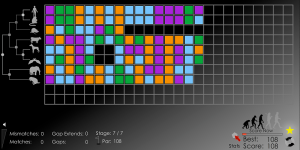
Phylo: Slide coloured blocks around to try to get the most colours lined up... simple but oddly addictive!
Fun Factor: 9/10 - Polished presentation and jazzy music. It’s pretty easy to pick up and put down.
Value to Humanity: 7/10 - Individual players aren’t likely to make any major breakthroughs, but each completed game adds an extra piece to the huge jigsaw of human genetic disease.
Good For: Sudoku gurus, Fans of colour-matching games like Bejeweled and Puzzle players with a short attention span.
Click here to play Phylo online!
What if You don’t like Computer Games?
Well there’s good news, because you can still be part of the action. Check out these links for more information on just a few of the different local, national and international citizen science projects:
http://scienceforcitizens.net/ - Site Based in the USA
BBC Radio Site on Citizen Science with lots of links
Share observations of Nature in the UK at iSpot
A Collection of UK Based Citizen Science Projects
Got a citizen science project to share? Feel free to let me know and I’ll post it here…





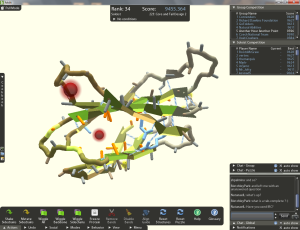

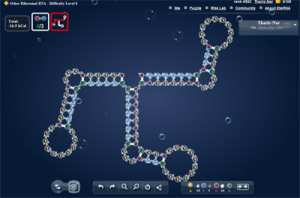





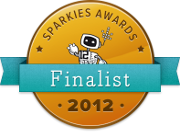
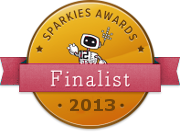



I love about science and health subjects too .
Posted by pranda | October 12, 2011, 9:38 am